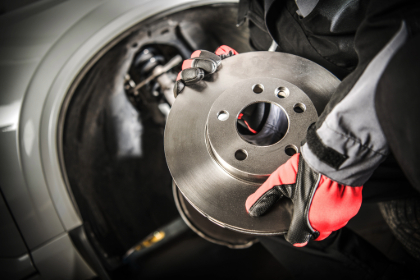OUR BLOG
Want to extend brake life? Learn simple maintenance tricks and driving habits from AED Marketing Inc. in Pasadena, TX, to keep your brakes performing longer.

Your car’s brakes are its most important safety system, always on standby to stop you when it matters most. But they don’t last forever—without proper care, they wear down faster than they should. The good news? A few simple habits can help you extend brake life and keep them working at their best. Let’s dive into some easy ways to take better care of your brakes!
Do you want your car to perform to its full potential? Experience the difference with AMSOIL’s high-performance products. Contact AED Marketing Inc. in Pasadena, TX, at (281) 507-8721 to get started, or shop at AMSOIL’s e-store to replenish your brake care supplies. Your car will perform better, last longer, and run smoother!
1. Drive Smart
Anticipate Stops and Slow Down Gradually
Sudden braking isn’t just jarring—it’s hard on your brakes. Every time you slam on the brakes, you’re wearing down your pads and rotors faster than necessary. Instead, try to anticipate stops by scanning the road ahead. If you see a red light or stop sign, ease off the accelerator and coast to a gradual stop. This simple habit can save your brakes from unnecessary wear and tear.
Use Engine Braking When Possible
Did you know your engine can help slow your car? In manual vehicles, downshifting can reduce speed without relying solely on the brakes. For automatic drivers, simply easing off the accelerator can achieve a similar effect. Engine braking not only reduces wear on your brake components but also prevents heat buildup, which can lead to premature damage.
Maintain a Safe Following Distance
Tailgating isn’t just dangerous—it’s also tough on your brakes. When you’re too close to the car in front, you’re forced to brake frequently and often abruptly. To avoid this, use the “three-second rule”: keep a three-second gap between you and the vehicle ahead. This gives you plenty of time to react and brake smoothly, extending the life of your pads and rotors.
2. Keep Your Braking System in Top Shape
Check Brake Pads and Rotors Regularly
Worn brake pads don’t just squeak—they can also damage your rotors, leading to expensive repairs. Make it a habit to inspect your brake pads every 10,000 miles or whenever you hear unusual noises like grinding or squealing. Catching issues early can save you money and keep your brakes performing at their best.
Flush and Replace Brake Fluid as Needed
Brake fluid can get dirty or absorb moisture over time, making your brakes less effective and even causing them to fail. To stay safe, have your brake fluid checked every 2-3 years and replace it as recommended by your car's manufacturer.
Inspect Brake Lines and Calipers for Leaks or Damage
Leaking brake fluid or stuck calipers can cause uneven wear and reduce braking efficiency. Regularly inspect your brake lines and calipers for signs of damage or leaks, especially before long trips. Addressing these issues early can prevent more serious problems down the road.
Experience superior braking power with AMSOIL DOT 3 and DOT 4 100% Synthetic Brake Fluid. Call AED Marketing Inc. in Pasadena, TX, at (281) 507-8721 to get yours. Prefer shopping online? Restock your brake care essentials at AMSOIL’s e-store now!
3. Invest in High-Quality Brake Components
Choose Premium Brake Pads and Rotors
Not all brake components are created equal. Organic brake pads are quiet but wear out quickly, while semi-metallic pads offer better performance but can be noisy. Ceramic pads, on the other hand, provide a perfect balance of durability, performance, and quiet operation. Pair these with high-quality rotors that dissipate heat effectively to reduce warping and extend brake life.
Use Synthetic Brake Fluid for Optimal Performance
Synthetic brake fluid is a great choice for your car’s braking system. It doesn’t absorb moisture easily, works well in both hot and cold weather, and gives you smooth, reliable braking. Switching to it means better performance and longer-lasting protection for your brakes.
4. Lastly, Adopt Safe Driving Practices
Avoid Riding the Brakes
Resting your foot on the brake pedal, even lightly, can generate heat and cause premature wear. Instead, keep your foot off the pedal unless you need to brake. On downhill roads, use lower gears to control your speed rather than riding the brakes continuously.
Don’t Overload Your Vehicle
Carrying too much weight puts extra strain on your brakes, causing them to wear out faster. Always check your vehicle’s load capacity and avoid overloading it. By keeping your car within its recommended weight limit, you’ll reduce stress on your braking system and extend its lifespan.